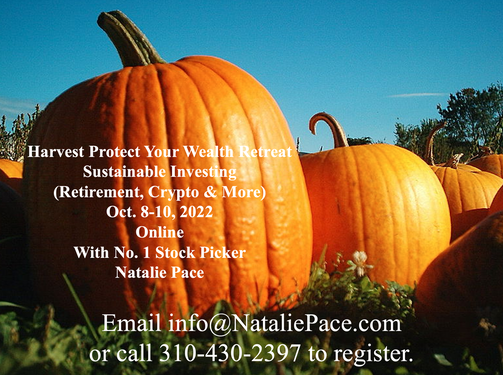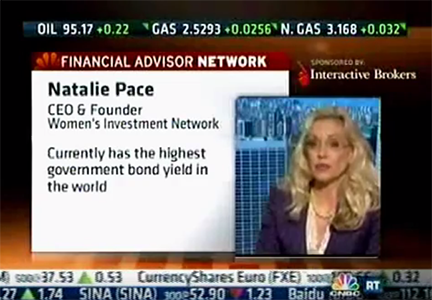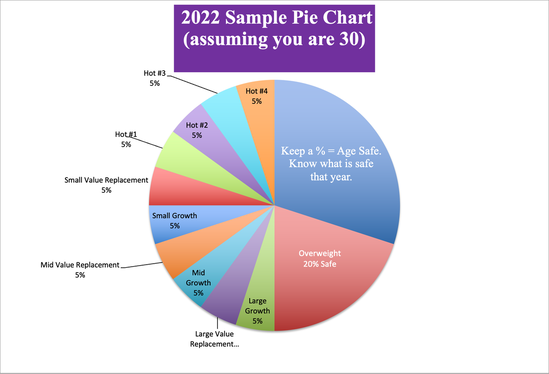|
3 Things To Do Before July 28th. This should take you less than five minutes to read, so that the focus can be on action rather than reading. You can take any of these action points deeper with other blogs/podcasts/webinars on each topic (links below). Why do I say to act before July 28th? The U.S. will know whether or not the country is in a recession at 8:30 AM Eastern time on July 28, 2022. (When the U.S. sneezes, the world catches a cold.) At this point it’s less a question of “will we?” and more a question of when? If we wait for the headlines that we’re in a recession, it can be too late. Learn the rising risk of a recession in my blog from July 13, 2022. The Bear Market If we have lost more than 6% that’s a red flag that our wealth plan is not properly diversified and protected. While we might think that we’ve already lost a lot, most 21st-century recessions have dropped by more than half. The S&P500 is currently down about 18% from its January 2022 highs, so the bottom could be a lot further down. If our portfolio is down 18% or more, it signals that we don’t have enough safe – that our plan is not well-designed for the bear market. When someone tells us to just hang on because the markets always come back and we’ll just be selling low if we make changes now, that is not the truth of 21st Century recessions. Buy & Hope worked well in the last century, but has been a disaster since 2000. The next bear market recession will not be a repeat of the Pandemic Recession, which was the shortest in history. We can’t print up almost $6 trillion and give it to everybody to save the day. In fact we’re doing the opposite. We are tightening up the money supply. Many people and corporations don’t have access to loans, and if they do, they’re paying a lot more in interest. Instead, we’re seeing savings dwindle and the markets weaken, which is a recipe for more trouble ahead. Federal Reserve Board Chairman Jerome Powell and others have gone on record a lot this year talking about taking our medicine and the pain that most of us are going to experience this year. So here’s our 3-step action plan that we should get started on now – before the 2Q 2022 GDP is announced on July 28, 2022.
And here is more information on each line item. Know How Much We’ve Lost It’s essential to know where we stand right now because this is an indicator of whether or not our plan is properly designed. If most of our wealth is in our retirement account and/or brokerage account, then it’s as simple as just looking at the statements from today comparing them to the statements from January of this year. You might ask your broker-salesman for a chart of your current plan’s performance compared to the S&P500 for the last 15 years (or at minimum 3 years). If you’ve lost as much or more than the S&P500, then it’s time to learn and implement a Wealth Protection strategy. That will require getting solutions from someone other than the person who designed the losing plan. We’re here to help with time-proven, 21st Century solutions. Email [email protected] or call 310-430-2397. Diversify and Protect Your Wealth A properly designed wealth plan protects us from losses in recessions and allows us to soar in bull markets. A lot of people check multiple boxes in their 401K, or have 18+ pages of holdings, and hope that they are properly protected and diversified as a result. 99% of the time, that is not the case. We must know what we own and why, and why it fits into the easy-as-a-pie-chart nest egg strategy. This easy plan with regular rebalancing earned gains in the Great and Dot Com Recessions (when most people lost more than half of their wealth) and outperformed the bull markets in between. (Click to learn more about regular rebalancing.) Know What is Safe in a Debt World While bonds are normally put on the safe “fixed income” side of the equation, today bonds are losing principal, while also being illiquid and negative-yielding. (Click to learn more in my podcast and webinar.) Many traditionally safe, fixed-income products are vulnerable or losing money. Regulators have claimed that Celsius Network’s promises that depositors were FDIC-insured were illegal. (Click to learn more about the Crypto Crash in my podcast and webinar.) So, who can you trust to protect your money – at a time when inflation is limiting our buying power? The safe side of your wealth plan is not supposed to lose money. As we age and get closer to retirement, we can’t afford to risk losing half or more of our wealth. So, the first step is to keep at least a percentage equal to your age safe. (We’re overweighting 20% safe due to the recession risk.) The second step is to consider safe, income-producing hard assets that you purchase for a good price. Believe it or not, there is some low-hanging fruit here (not high-priced real estate). You can read about What’s Safe in a Debt World in that section of The ABCs of Money 5th edition. You can learn and implement a safer strategy by attending our Financial Freedom retreats. You can also reach out for an unbiased 2nd opinion on your current plan to receive color-coded, step-by-step analysis of what you currently have and what a safer plan looks like. When our physical health is at risk, we get a second opinion. So, let’s be sure to do that for our fiscal health and future, too. Why Bonds, Money Market Funds and Annuities are Vulnerable In most recessions, the Federal Reserve Board will cut interest rates to spark economic growth. That action actually makes existing bonds with a higher interest rate more valuable. When the FOMC raises rates, the existing bond value (with a lower interest rate) goes down. Today, there is credit risk, in addition to interest-rate risk, and also duration risk and opportunity costs. Annuities are not FDIC-insured (so vulnerable, just like the Celsius Network deposits were). Money market funds have redemption gates and liquidity fees, and can lose money. Bottom Line It’s time to know exactly what we own and why, and to protect our fiscal health. We can’t just have blind faith that some financial professional is doing this for us, particularly if we have more than 10% in losses to date. Take this July 28 deadline date seriously. Consider registering for the October retreat now, so that you get immediate access to the four-part webinar series. If you have a lot at stake, email [email protected] to learn about getting an unbiased 2nd opinion from me personally on your current wealth plan. If you're interested in learning 21st Century time-proven investing strategies for protecting your wealth and managing the bear market from a No. 1 stock picker, join us for our Oct. 8-10, 2022 Financial Freedom Retreat. Email [email protected] or call 310-430-2397 to learn more and to register. Click on the banner ad below to discover the 18+ strategies you'll learn and master. Get the best price when you register with friends and family. Register now to access your free 4-part Protect Your Wealth Now webinar that will get you started immediately.  Join us for our Financial Freedom Retreat. Oct. 8-10, 2022. Email [email protected] to learn more. Register with friends and family to receive the best price and a free 4-part webinar (which you can access to protect your wealth now). Click for testimonials & details.  Natalie Wynne Pace is an Advocate for Sustainability, FinancialLiteracy & Women's Empowerment. Natalie is the bestselling author of The Power of 8 Billion: It's Up to Us and is the co-creator of the Earth Gratitude Project. She has been ranked as a No. 1 stock picker, above over 835 A-list pundits, by an independent tracking agency (TipsTraders). Her book The ABCs of Money remained at or near the #1 Investing Basics e-book on Amazon for over 3 years (in its vertical), with over 120,000 downloads and a mean 5-star ranking. The 5th edition of The ABCs of Money was released on September 17, 2021. Natalie Pace's easy as a pie chart nest egg strategies earned gains in the last two recessions and have outperformed the bull markets in between. That is why her Investor Educational Retreats, books and private coaching are enthusiastically recommended by Nobel Prize winning economist Gary S. Becker, TD AMERITRADE chairman Joe Moglia, Kay Koplovitz and many Main Street investors who have transformed their lives using her Thrive Budget and investing strategies. Click to view a video testimonial from Nilo Bolden. Check out Natalie Pace's Apple Podcast. Watch videoconferences and webinars on Youtube. Other Blogs of Interest Recession Risks Rise + a Fairly Safe High-Yield Bond DAQO Doubles. Solar Shines. Which Company is Next in Line? Tesla Sales Disappoint. Asian EV Competition Heats Up. 10 Wealth Strategies of the Rich Copper Prices Plunge Colombia and Indonesia: Should You Invest? 10 Misleading Broker/Salesman Pitches. Why are Banks and Dividend Stocks Losing Money? Beyond Meat: Rare or Burnt? Netflix Streaming Wars End in a Bloodbath. Elon Musk Sells $23 Billon in Tesla Stock and Receives $23 Billion in Options. Are You Gambling With Your Future? ESG Investing: Missing the E. Moderna & Biotech Trade at 2-Year Lows. Bitcoin Crashes. Crypto, Bold and Stocks All Crash. The Economy Contracted -1.4% in 1Q 2022. The Dow Dropped 2000 Points. Is Plant-Based Protein Dying? Should You Sell in April? The U.S. House Decriminalizes Cannabis Again. Chinese Electric Vehicle Market Share Hits 20%. The Risk of Recession in 6 Charts. High Gas Prices How Will Russian Boycotts Effect U.S. Multinational Companies? Oil and Gas Trends During Wartime Russia Invades Ukraine. How Have Stocks Responded in Past Wars? Zombie Companies. Rescue, Rehab or Liquidate? Spotify: Music to my Ears. Cannabis Crashes. 2022 Crystal Ball in Stocks, Real Estate, Crypto, Cannabis, Gold, Silver & More. Interview with the Chief Investment Strategist of Charles Schwab & Co., Inc. Stocks Enter a Correction Investor IQ Test Investor IQ Test Answers Real Estate Risks. What Happened to Ark, Cloudflare, Bitcoin and the Meme Stocks? Omicron is Not the Only Problem From FAANNG to ZANA MAD MAAX Ted Lasso vs. Squid Game. Who Will Win the Streaming Wars? Starbucks. McDonald's. The Real Cost of Disposable Fast Food. The Plant-Based Protein Fire-Sale What's Safe in a Debt World? Inflation, Gasoline Prices & Recessions China: GDP Soars. Share Prices Sink. The Competition Heats Up for Tesla & Nio. How Green in Your Love for the Planet? S&P500 Hits a New High. GDP Should be 7% in 2021! Will Work-From-Home and EVs Destroy the Oil Industry? Insurance and Hedge Funds are at Risk and Over-Leveraged. Office Buildings are Still Ghost Towns. Money Market Funds, FDIC, SIPC: Are Any of Them Safe? My 24-Year-Old is Itching to Buy a Condo. Should I Help Him? The 12-Step Guide to Successful Investing. Gardeners Creating Sanctuary & Solutions in Food Deserts. 2021 Company of the Year Almost 5 Million Americans are Behind on Rent & Mortgage. Real Estate Hits All-Time High. Rebalancing Your Nest Egg IQ Test. Answers to the Rebalancing Your Nest Egg IQ Test. Videoconferencing in a Post-Pandemic World (featuring Zoom & Teladoc). Sanctuary Sandwich Home. Multigenerational Housing. Interview with Lawrence Yun, the chief economist of the National Association of Realtors. 10 Budget Leaks That Cost $10,000 or More Each Year. The Stimulus Check. Party Like It's 1999. Would You Pay $50 for a Cafe Latte? Is Your Tesla Stock Overpriced? 10 Questions for College Success. Is FDIC-Insured Cash at Risk of a Bank Bail-in Plan? 8 Money Myths, Money Pits, Scams and Conspiracy Theories. Why Are My Bonds Losing Money? The Bank Bail-in Plan on Your Dime. Important Disclaimers Please note: Natalie Pace does not act or operate like a broker. She reports on financial news, and is one of the most trusted sources of financial literacy, education and forensic analysis in the world. Natalie Pace educates and informs individual investors to give investors a competitive edge in their personal decision-making. Any publicly traded companies or funds mentioned by Natalie Pace are not intended to be buy or sell recommendations. ALWAYS do your research and consult an experienced, reputable financial professional before buying or selling any security, and consider your long-term goals and strategies. Investors should NOT be all in on any asset class or individual stocks. Your retirement plan should reflect a diversified strategy, which has been designed with the assistance of a financial professional who is familiar with your goals, risk tolerance, tax needs and more. The "trading" portion of your portfolio should be a very small part of your investment strategy, and the amount of money you invest into individual companies should never be greater than your experience, wisdom, knowledge and patience. Information has been obtained from sources believed to be reliable. However, NataliePace.com does not warrant its completeness or accuracy. Opinions constitute our judgment as of the date of this publication and are subject to change without notice. This material is not intended as an offer or solicitation for the purchase or sale of any financial instrument. Securities, financial instruments or strategies mentioned herein may not be suitable for all investors. Comments are closed.
|
AuthorNatalie Pace is the co-creator of the Earth Gratitude Project and the author of The Power of 8 Billion: It's Up to Us, The ABCs of Money, The ABCs of Money for College, The Gratitude Game and Put Your Money Where Your Heart Is. She is a repeat guest & speaker on national news shows and stages. She has been ranked the No. 1 stock picker, above over 830 A-list pundits, by an independent tracking agency, and has been saving homes and nest eggs since 1999. Archives
July 2024
Categories |








 RSS Feed
RSS Feed